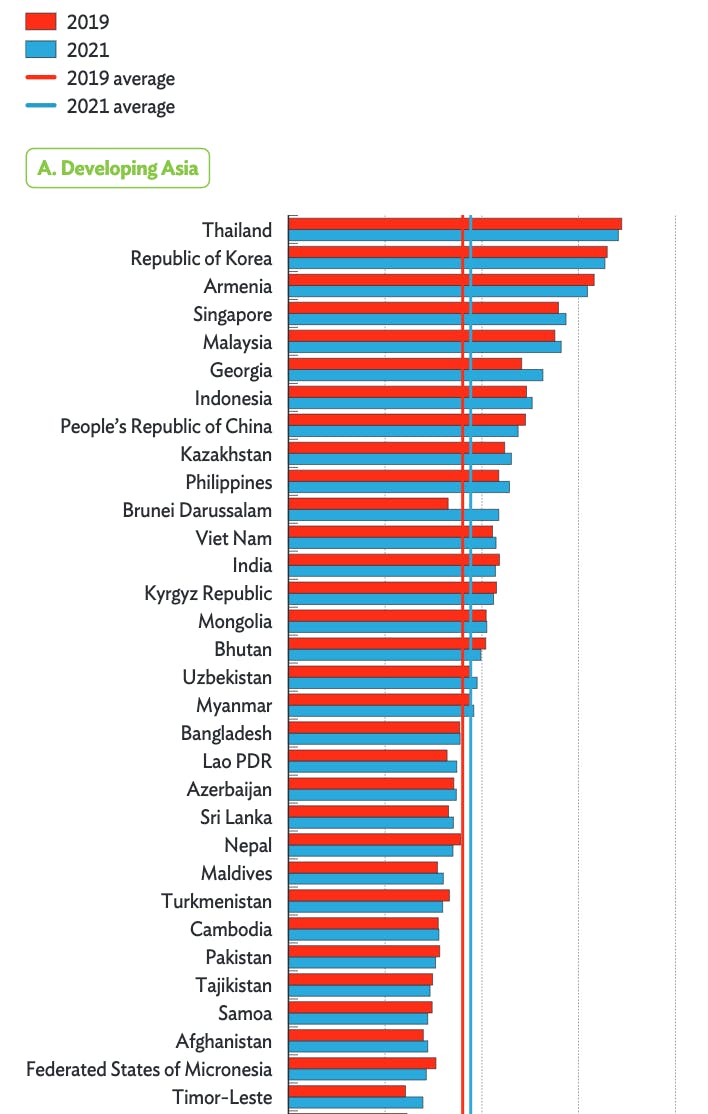The world will never forget how four years ago, the Covid 19 pandemic laid bare global health system deficiencies, resulting in millions of deaths and long-term illnesses.
To continue reading, subscribe to Eco‑Business.
There's something for everyone. We offer a range of subscription plans.
- Access our stories and receive our Insights Weekly newsletter with the free EB Member plan.
- Unlock unlimited access to our content and archive with EB Circle.
- Publish your content with EB Premium.
In Southeast Asia, some countries stood out for weathering the pandemic better than their neighbours through early investment in health infrastructure, according to a report released on Thursday by the Asian Development Bank (ADB).
Thailand emerged on top in the Global Health Security Index (GHSI), which ADB featured in its study. The survey compared economies’ preparedness to meet international health regulations in 2019 to two years later in 2021.
The upper middle-income nation scored highest in the region in terms of health security based on its preparedness, prevention, detection, rapid response, compliance with international norms, and risk environment.
Singapore, the region’s only high-income economy, came in second. The city-state was able to leverage the biggest workforce of Covid testers in Asia.
“
It is not always the case that an economy with a higher health security index performs better than another with a lower index in handling a pandemic like Covid-19.
Minhaj Mahmud, senior economist, Asian Development Bank
The Philippines and Vietnam were found to have almost equal capacity to prevent and respond to epidemics and pandemics.
Although the socialist republic had a limited number of clinics, hospitals and community care centres, it managed to focus on prevention during the start of the Covid outbreak and registered fewer than 2,000 cases throughout the start of the crisis in 2020.
In contrast, the Philippines recorded the worst Covid outbreak in Southeast Asia, despite imposing the longest, strictest lockdown in the region.
“It is not always the case that an economy with a higher health security index performs better than another with a lower index in handling a pandemic like Covid-19,” Minhaj Mahmud, senior economist of ADB and one of the report’s authors, told Eco-Business. “Vietnam, like Thailand, has invested substantially in healthcare worker recruitment and training, along with universal health coverage.”

The Global Health Security Index (GHSI) for 2019 and 2021. In Southeast Asia, Thailand and Singapore scored highest in the index, which measures economies’ preparedness to meet international health regulations. Source: ADB
Learning from the past
Thailand has long invested in health infrastructure, including primary health facilities, hospitals, and health worker training. The kingdom leveraged its network of over one million community workers to help prevent, detect, and report Covid cases, which made it the first Asian country to contain the virus in 2020.
According to the first GHSI survey done in 2019, Thailand had an overall score of 73.2 compared with the 40.2 global average. It ranked second for the robustness of its health system (70.5 compared to the global average of 26.4) and third for disease prevention (75.7 compared to a global average of 34.8).
Besides its early investments in preventive healthcare, Vietnam’s exposure to previous epidemics such as Severe Acute Respiratory Syndrome (SARS) in 2003 and human cases of avian influenza between 2004 and 2010 helped the country prepare for Covid. Instead of relying on expensive measures such as mass testing, it rapidly closed its borders and strictly implemented quarantine protocols on foreign arrivals, based on its prior experience with the SARS, avian and swine flu outbreaks.
Indonesia, which was one of the worst-hit countries in the region by the pandemic, recovered after it launched a mass inoculation campaign. It activated its avian influenza laboratory network, a web-based system that monitors influenza viruses in the country, to support Covid-19 efforts.
In Singapore, both private and university laboratories jointly conducted a mass testing programme in 2021, which was the result of agreements forged during the Middle East respiratory syndrome (MERS)–related coronavirus epidemic in 2015.
Data gap
ADB said that the 2021 index showed that one year into the pandemic, health security capacity did not improve much in the region or elsewhere around the world.
Only 20 per cent of 195 economies have allocated specific funding from the national budget over the past three years to improve their ability to respond to the threat of an epidemic, including Southeast Asian countries Indonesia and Timor-Leste.
“Southeast Asian economies need to emphasise on the health of people, animals, and ecosystem, in which a broader set of stakeholders is needed to respond effectively to biological and environmental threats,” said Mahmud. “They also need to strengthen data infrastructure and linkability, as well as regulations to promote data and knowledge sharing.”

















